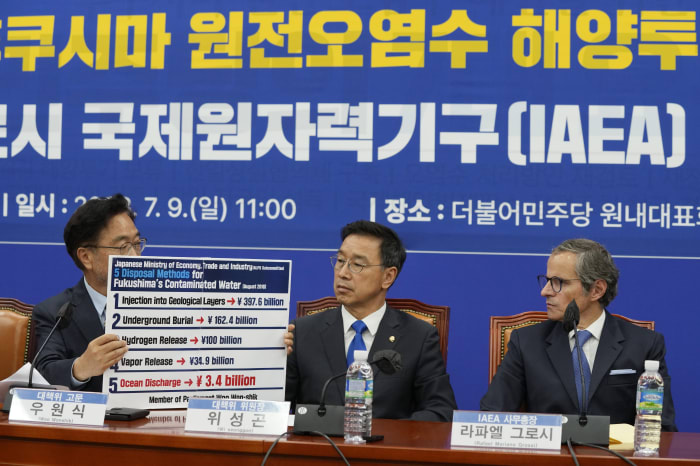South Korean MPs criticize IAEA director over Japan plan to release Fukushima treated water

Seoul – South Korean opposition lawmakers approved Japan’s plan to release treated wastewater from the damaged Fukushima nuclear power plant as protesters yelled outside their doors during a tense meeting in Seoul on Sunday. He severely criticized the head of the United Nations Nuclear Observatory.
International Atomic Energy Agency Director-General Rafael Mariano Grossi arrived in South Korea over the weekend to meet with government officials and commentators and to allay public concerns about food safety. A plan to release the Fukushima plant’s process wastewater has become a major hit in South Korea after the IAEA approved Japan’s release plan last week, saying the process meets international safety standards and has negligible environmental and health impacts. emerged as a political issue.
The South Korean government also supports the safety of Japan’s plan, stating that the level of contamination of water pumped from the plant is within permissible standards and that the plant’s treatment system will have a significant impact on South Korean waters as long as it functions as designed. said no.
In a meeting with visiting lawmakers from the Liberal Democratic Party, which holds a majority in South Korea’s parliament, Grossi said the IAEA’s review of Japan’s plan was based on “transparent” and “scientific” research, saying that Japan’s plan I acknowledged my concerns about how it would be done. It will be rolled out, he said, adding that the IAEA will set up a permanent office in Fukushima and closely monitor how the emissions process performs over the next 30 years.
Lawmakers have sharply criticized the IAEA review, which ignores the long-term environmental and health impacts of wastewater discharge and threatens to set a bad precedent for other countries to dump nuclear waste into the ocean. claimed to have They urged Japan to withdraw its wastewater plans and work with neighboring countries to find safer ways to treat wastewater, including the possibility of long-term storage on land.
The party also criticized South Korean President Yoon Seok-yeol’s government for putting public health at risk while trying to improve relations with Japan.
“If you think[treated wastewater]is safe, why not propose to the Japanese government to use it for drinking, industrial and agricultural purposes instead of dumping it into the sea?” Wonshik said. A Democrat who attended the meeting told Mr. Grossi. The party said Wu has been on hunger strike for the past 14 days to protest Japan’s plans to discharge the military.
Further details of the meeting were not immediately available after reporters were asked to leave after opening statements. Dozens of protesters shouted in a nearby hall holding placards denouncing the IAEA and Japan, closely monitored by parliamentary security staff.
Hundreds of demonstrators also marched in downtown Seoul on Saturday to demand Japan withdraw its plans to discharge the military. The protests provided a tense backdrop for meetings between Grossi and South Korean Foreign Minister Park Jin, calling for the IAEA’s “active cooperation” to reassure South Koreans.
The safety of Fukushima wastewater has long been a sensitive issue among US allies. In recent months, South Korea and Japan have repair a long and strained relationship It addresses common concerns over historical grievances during the war, including the North Korean nuclear threat and China’s hardline foreign policy.
South Korea’s assessment of the safety of its release plan is based in part on observations by a team of government scientists who were granted a tour of the Fukushima nuclear plant in May. Japanese Prime Minister Fumio Kishida agreed to the visit, expressing a desire to improve relations with Yoon during a May 7 summit in Seoul.
North Korea also criticized Japan’s plans to release “nuclear-contaminated water” in a statement released by state media on Sunday, warning of “fatal adverse effects on human life, security and the ecological environment” from releasing “nuclear-contaminated water.” The statement, attributed to an unnamed official at North Korea’s Ministry of Land and Environmental Protection, was also criticized by the United States and South Korea for supporting the Japanese plan.
“What is important is the IAEA’s unreasonable behavior in actively favoring and promoting Japan’s plan to release nuclear-contaminated water, which is unimaginable,” the report said. “Worse still, the United States and South Korea have openly expressed an unseemly ‘welcome’ to Japan’s condemned and denial plan, provoking strong public outrage.”
The 2011 earthquake and tsunami destroyed the cooling system at the Fukushima nuclear power plant, melting three reactors and releasing large amounts of radiation.
Tokyo Electric Power Company Holdings, which operates the facility, stores the treated water in hundreds of tanks, which now cover much of the plant and are nearly full. Japanese officials need to remove tanks to make room for building facilities for nuclear plant decommissioning and to minimize the risk of leaks in the event of a further catastrophe. claims. The tank is expected to reach its 1.37 million tonne capacity in early 2024.
Japan first announced plans to release the treated water into the sea in 2018, saying it would further dilute the treated water with seawater before releasing it in a carefully controlled process that would take decades to complete.
Copyright 2023 Associated Press. all rights reserved. This material may not be published, broadcast, rewritten or redistributed without permission.
https://www.local10.com/news/world/2023/07/09/south-korean-lawmakers-berate-iaea-chief-over-japanese-plans-to-release-treated-fukushima-wastewater/ South Korean MPs criticize IAEA director over Japan plan to release Fukushima treated water



